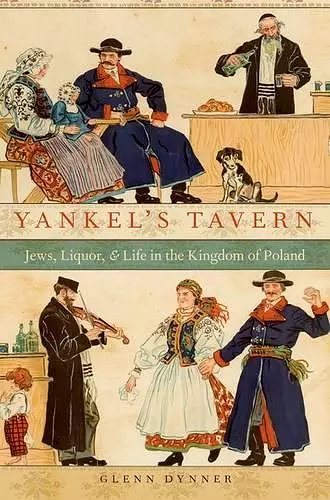Yankel's Tavern
Jews, Liquor, and Life in the Kingdom of Poland
Format:Paperback
Publisher:Oxford University Press Inc
Published:15th Jan '15
Currently unavailable, and unfortunately no date known when it will be back

In nineteenth-century Eastern Europe, the Jewish-run tavern was often the center of leisure, hospitality, business, and even religious festivities. As liquor became the region's boom industry, Jewish tavernkeepers became integral to both local economies and local social life, presiding over Christian celebrations and dispensing advice, medical remedies and loans. Nevertheless, reformers and government officials, blaming Jewish tavernkeepers for epidemic peasant drunkenness, sought to drive Jews out of the liquor trade. Their efforts were particularly intense and sustained in the Kingdom of Poland. Historians have assumed that this spelled the end of the Polish Jewish liquor trade. However, in Yankel's Tavern, Glenn Dynner uses newly discovered archival sources to demonstrate that many nobles helped their Jewish tavernkeepers evade fees, bans, and expulsions by installing Christians as fronts for their taverns. The result-a vast underground Jewish liquor trade-reflects an impressive level of local Polish-Jewish co-existence that contrasts with the more familiar story of anti-Semitism and violence.
Glenn Dynner has written a history of Jewish tavern keepers that serves as a point of entry into a much broader challenge to a surprisingly diverse swath of conventional wisdom about Jewish life in the Polish lands of the Russian Empire. For this reason, Yankel s Tavern should be required reading for anyone interested in Jewish history, Polish history, Russian imperial history, nationalism and national identity, and the economic history of eastern Europe. Without ever adopting an aggressive or polemical tone, Dynner has launched several debates that are sure to continue for years to come....[Dynner]offers a story of nuance and complexity, one that defies any attempt to squeeze it into the simplistic dualities that have long weakened both Polish and Jewish history. This alone should place Yankel's Tavern on everyone's must-read list. * AJS Review *
[An] erudite, meticulously researched, and refreshingly original new book... * Jewish Review of Books *
Yankel's Tavern is an interesting work that provides insight into the social, economic, political and religious realities of Jews during this time period. The book is a pleasure to read and accessible to the scholar and non-scholar alike. * Association of Jewish Library Reviews *
Dynner s rich archival discoveries lead him into multifarious aspects of Jewish life in the Congress Kingdom. He offers a thoughtful survey of Jewish perspectives on the Polish insurrections of 1830 31 and 1863. * Times Literary Supplement *
The sacred, the profane, and the 45-percent proof are at the heart of Glenn Dynner's new book, Yankel's Tavern: Jews, Liquor, and Life in the Kingdom of Poland. Like all fine scholarly work, this...volume contains multitudes. * Tablet Magazine *
Meticulously researched, judiciously analyzed and deeply engaging, Yankel's Tavern sets a new standard in Jewish social history. Dynner succeeds admirably in cutting through the swath of filio-pietistic myth and anti-Semitic invective that envelops the Eastern European Jewish past. His enthusiasm for reconstructing the 'tragi-comic' lives of ordinary people is positively infectious. A rich and stimulating read. * Olga Litvak, author of Haskalah: The Romantic Movement in Judaism *
Dynner shifts the focus of nineteenth-century Polish-Jewish history from government policy, ideological movements and secularization to the lives of real people and the persistence of traditional social, economic and cultural patterns. Using the pervasive liquor trade as a prism, he illuminates both the myths and the reality of the complexities and perplexities of the Polish-Jewish symbiosis. * Moshe Rosman, author of The Lords' Jews: Magnate-Jewish Relations in the Polish-Lithuanian Commonwealth *
Based upon massive new archival research, Glenn Dynner presents a wide-ranging portrait of the Jewish-run tavern, a central but overlooked institution of Polish Jewry. Drawing on a remarkable range of sources - legal, administrative, rabbinic, and literary - he illuminates the social, economic, religious and political ramifications of his subject. A sobering view of an intoxicating subject, told with sensitivity, nuance, and balance. * Jerry Z. Muller, author of Capitalism and the Jews *
Dynner's short monograph is a remarkable achievement. The book is one of those rare academic accomplishments: persuasive yet concise. * Kevin Goldberg, European History Quarterly *
ISBN: 9780190204143
Dimensions: 231mm x 171mm x 15mm
Weight: 399g
272 pages